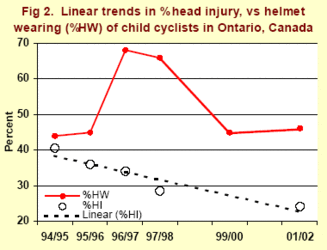Cyclopathic
Veteran
- Location
- Leicester.
I would think the answer to whether or not helmets provide any protection would be if there had been a study which recorded accidents and the damage done to the rider. With a big enough survey it would be possible to see exactly what benefits or protection a helmet really offered. I would have thought this sort of test would have been carried out by the same sort of organisation who collected data an seat belts and the protection offered.
Wouldn't hospitals be able to provide information to an organisation or individual who wanted to asses the protectiveness of helmets? Excuse my niavety or ignorance but it seems to me that these figures should be available somewhere and if not it would be easy enough for an intersted body to find out (with enough resources) If that is the case then I can't see why the debate over helmet use is as subjective as it appears to be. Either they prevent and lessen injury or they do not. This will be shown in the data.
There may be reasons why people don't wear helmets but I just feel that the reason that they provide no protection is one that could be settled in a trice if there was a will. Can someone please tell me what I'm missing here.
Wouldn't hospitals be able to provide information to an organisation or individual who wanted to asses the protectiveness of helmets? Excuse my niavety or ignorance but it seems to me that these figures should be available somewhere and if not it would be easy enough for an intersted body to find out (with enough resources) If that is the case then I can't see why the debate over helmet use is as subjective as it appears to be. Either they prevent and lessen injury or they do not. This will be shown in the data.
There may be reasons why people don't wear helmets but I just feel that the reason that they provide no protection is one that could be settled in a trice if there was a will. Can someone please tell me what I'm missing here.

